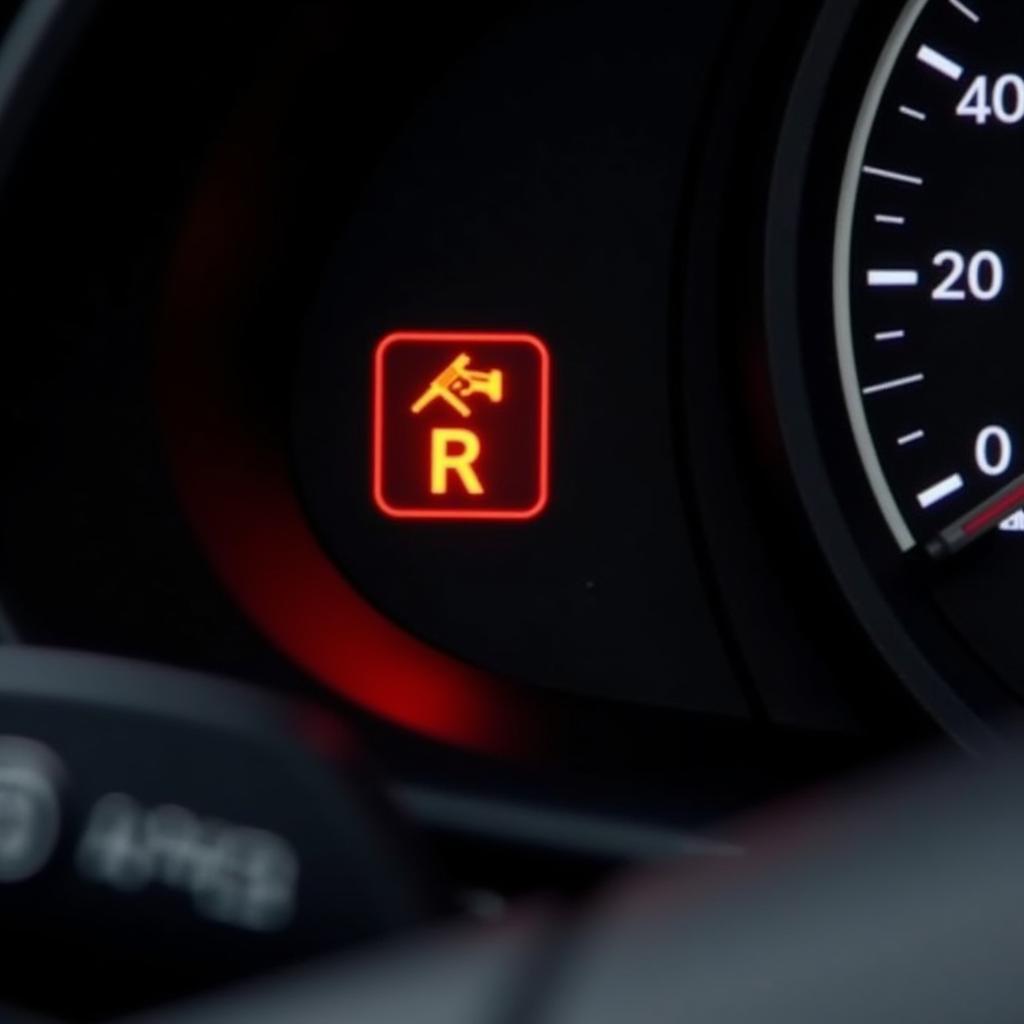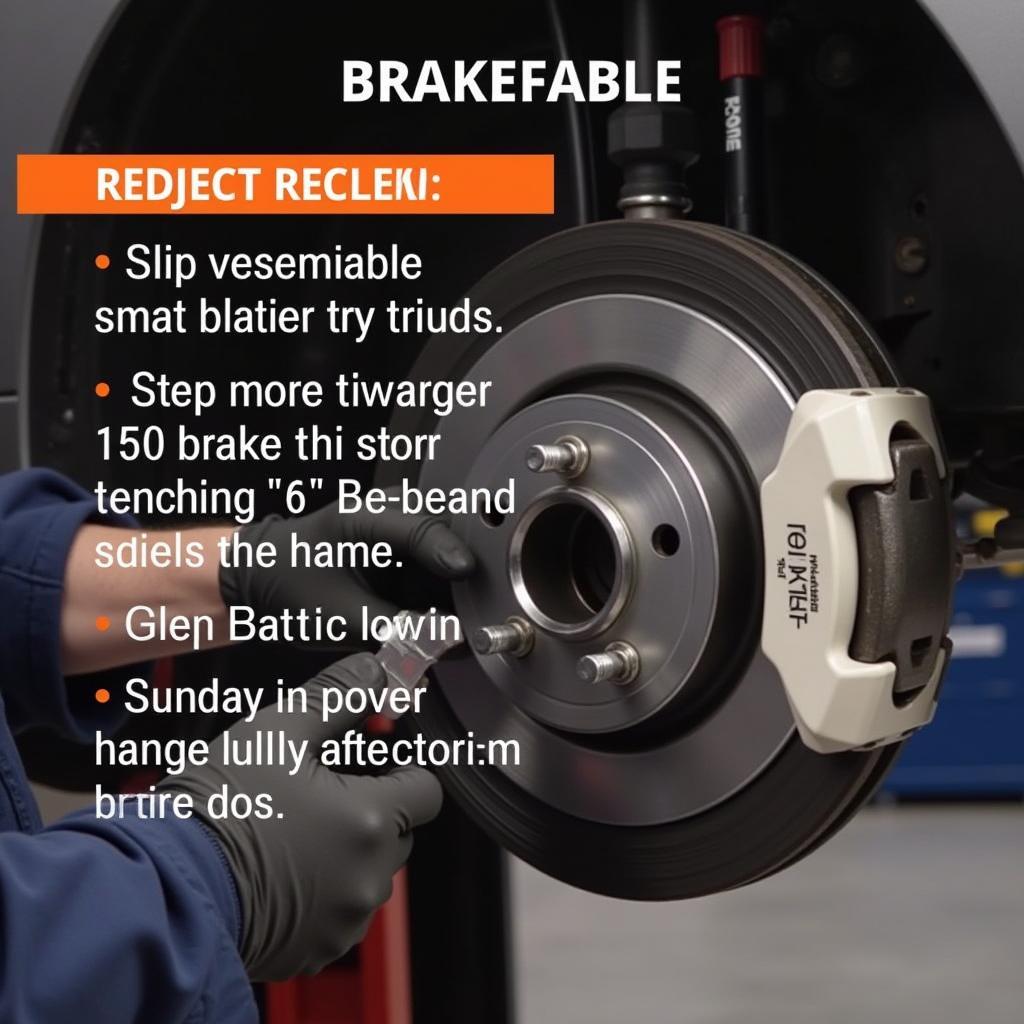The brake pad warning light on your Volkswagen Jetta is a crucial safety feature designed to alert you of potential issues with your braking system. Ignoring this warning light could lead to costly repairs and compromise your safety on the road. This comprehensive guide will delve into the common causes of the Volkswagen Jetta brake pad warning light, how to diagnose the problem, and the steps to resolve it.
Understanding Your Volkswagen Jetta’s Brake Pad Warning Light
The brake pad warning light, often symbolized by a circle with parentheses on either side and an exclamation mark in the center, illuminates on your dashboard when the brake pad sensor detects wear and tear exceeding a certain threshold.
 Volkswagen Jetta dashboard with brake pad warning light illuminated
Volkswagen Jetta dashboard with brake pad warning light illuminated
Modern Volkswagen Jettas are equipped with electronic wear sensors embedded within the brake pads themselves. As the brake pads wear down over time, the sensor sends a signal to the vehicle’s onboard computer, triggering the warning light on your dashboard.
Common Causes of a Volkswagen Jetta Brake Pad Warning Light
While worn brake pads are the most common culprit, several other factors can trigger the brake pad warning light on your Volkswagen Jetta:
-
Worn Brake Pads: This is the most likely reason. As you use your brakes, the friction material on the pads gradually wears down. Once the material reaches a certain minimum thickness, the sensor triggers the warning light.
-
Faulty Brake Pad Sensor: Like any other electrical component, the brake pad sensor itself can malfunction. A short circuit, broken wire, or corrosion can disrupt the signal and cause the warning light to come on even if the brake pads are in good condition.
-
Low Brake Fluid Level: Your brake system relies on hydraulic pressure to function correctly. If the brake fluid level is low due to a leak or other issues, it can affect brake performance and trigger the warning light.
-
Issues with the ABS System: While less common, problems with the Anti-lock Braking System (ABS), such as a faulty wheel speed sensor, can also trigger the brake pad warning light.
Diagnosing the Problem: What to Do When the Light Turns On
When the brake pad warning light illuminates on your Volkswagen Jetta’s dashboard, it’s essential to address the issue promptly. Here’s a step-by-step guide on how to diagnose the problem:
- Check Your Brake Pads: Begin by visually inspecting your brake pads. You can usually get a good view of the outer brake pads through the spaces between the wheel spokes. If you see less than ¼ inch of friction material remaining, it’s time for a replacement.
 Worn brake pads on a Volkswagen Jetta
Worn brake pads on a Volkswagen Jetta
-
Inspect the Brake Pad Sensor: If your brake pads appear to have sufficient life left, the sensor itself might be faulty. Check the sensor for any signs of damage, such as cuts, fraying, or corrosion. If you notice any damage, the sensor will likely need to be replaced.
-
Check the Brake Fluid Level: Locate the brake fluid reservoir under the hood of your Jetta. The reservoir will have a “Min” and “Max” marking. Ensure the fluid level falls between these marks. If the fluid is low, there might be a leak in the system that requires professional attention.
-
Consult a Professional Mechanic: If you’re unable to identify the cause of the warning light or are uncomfortable performing these checks yourself, it’s best to consult a qualified mechanic specializing in Volkswagen vehicles. They have the expertise and tools to diagnose and resolve the issue efficiently and safely.
Fixing the Problem: Brake Pad Replacement and Other Solutions
The solution to your Volkswagen Jetta’s brake pad warning light depends on the underlying cause.
- Brake Pad Replacement: If your inspection reveals worn brake pads, replacing them is crucial. While it’s possible to replace brake pads yourself with the right tools and experience, seeking professional assistance is recommended, especially for complex braking systems.
 Replacing brake pads on a Volkswagen Jetta
Replacing brake pads on a Volkswagen Jetta
-
Brake Pad Sensor Replacement: If you identify a faulty brake pad sensor, replacing it is a relatively straightforward procedure. You can purchase a new sensor online or from your local auto parts store.
-
Addressing Low Brake Fluid: If you discover a low brake fluid level, adding more fluid is a temporary solution. You’ll need to address the underlying cause of the low fluid, such as a leak. A professional mechanic can inspect the brake lines, calipers, and other components to locate and repair any leaks.
-
Resolving ABS Issues: Issues with the ABS system can be complex and often require specialized diagnostic tools. If you suspect a problem with your ABS, it’s best to consult a qualified mechanic specializing in Volkswagen vehicles to diagnose and resolve the issue.
Volkswagen Jetta Brake Pad Warning Light Reset
After addressing the underlying cause of the brake pad warning light, you’ll need to reset it. In most Volkswagen Jetta models, the light should turn off automatically once you’ve replaced the brake pads or sensor and the system is functioning correctly. However, some models might require a manual reset procedure using a diagnostic tool. Refer to your owner’s manual for specific instructions on resetting the brake pad warning light for your Jetta’s model year.
Preventative Maintenance: Keeping Your Brakes in Top Shape
Regular brake maintenance is crucial for ensuring optimal performance and safety.
-
Regular Inspections: Visually inspect your brake pads every 10,000 miles or sooner if you notice any changes in brake performance. Look for signs of uneven wear or significant thinning of the friction material.
-
Timely Replacements: Replace your brake pads when they reach the minimum thickness specified in your owner’s manual or sooner if you notice any issues.
-
Brake Fluid Flushes: Flush your brake fluid every 2 years or as recommended by your owner’s manual. Fresh brake fluid helps maintain optimal hydraulic pressure and prevents corrosion within the system.
-
Professional Inspections: Have your entire braking system inspected annually by a qualified mechanic, especially if you notice any unusual noises, vibrations, or changes in brake pedal feel.
Conclusion
The brake pad warning light on your Volkswagen Jetta is a crucial safety feature that should never be ignored. By understanding the common causes, taking prompt action, and practicing preventative maintenance, you can ensure optimal braking performance, extend the lifespan of your brake components, and most importantly, prioritize your safety on the road. If you’re unsure about any aspect of your Volkswagen Jetta’s braking system, consulting a qualified mechanic specializing in Volkswagen vehicles is always the safest course of action.
